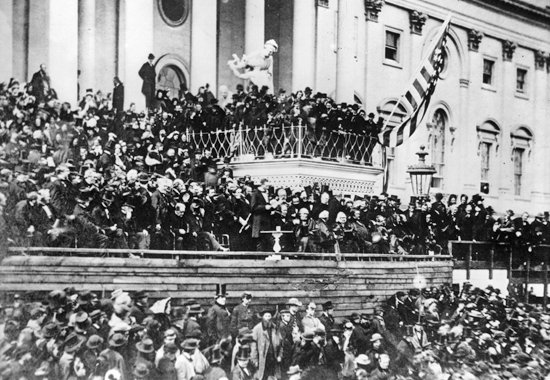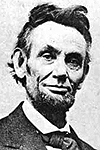|

ABRAHAM LINCOLN'S SECOND INAUGURATION - 1865
Lincoln's Second Inaugural Address
It follows the full text transcript of
Abraham Lincoln's Second Inaugural Address,
delivered on the East Portico of the U.S. Capitol,
Washington DC - March 4, 1865.

 |
Fellow Countrymen, |
At this second
appearing to take the oath of the Presidential
office there is less occasion for an extended
address than there was at the first. Then a
statement somewhat in detail of a course to be
pursued seemed fitting and proper.
Now, at the
expiration of four years, during which public
declarations have been constantly called forth
on every point and phase of the great contest
which still absorbs the attention and engrosses
the energies of the nation, little that is new
could be presented.
The progress of our arms,
upon which all else chiefly depends, is as well
known to the public as to myself, and it is, I
trust, reasonably satisfactory and encouraging
to all. With high hope for the future, no
prediction in regard to it is ventured.
On the occasion corresponding to this four years
ago all thoughts were anxiously directed to an
impending civil war. All dreaded it, all sought
to avert it. While the inaugural address was
being delivered from this place, devoted
altogether to saving the Union without war,
insurgent agents were in the city seeking to
destroy it without war--seeking to dissolve the
Union and divide effects by negotiation.
Both
parties deprecated war, but one of them would
make war rather than let the nation survive, and
the other would accept war rather than let it
perish, and the war came.
One-eighth of the whole population were colored
slaves, not distributed generally over the
Union, but localized in the southern part of it.
These slaves constituted a peculiar and powerful
interest. All knew that this interest was
somehow the cause of the war. To strengthen,
perpetuate, and extend this interest was the
object for which the insurgents would rend the
Union even by war, while the Government claimed
no right to do more than to restrict the
territorial enlargement of it.
Neither party
expected for the war the magnitude or the
duration which it has already attained. Neither
anticipated that the cause of the conflict might
cease with or even before the conflict itself
should cease. Each looked for an easier triumph,
and a result less fundamental and astounding.
Both read the same Bible and pray to the same
God, and each invokes His aid against the other.
It may seem strange that any men should dare to
ask a just God's assistance in wringing their
bread from the sweat of other men's faces, but
let us judge not, that we be not judged. The
prayers of both could not be answered. That of
neither has been answered fully.
The Almighty has
His own purposes. "Woe unto the world because of
offenses; for it must needs be that offenses
come, but woe to that man by whom the offense
cometh." If we shall suppose that American
slavery is one of those offenses which, in the
providence of God, must needs come, but which,
having continued through His appointed time, He
now wills to remove, and that He gives to both
North and South this terrible war as the woe due
to those by whom the offense came, shall we
discern therein any departure from those divine
attributes which the believers in a living God
always ascribe to Him?
Fondly do we hope,
fervently do we pray, that this mighty scourge
of war may speedily pass away. Yet, if God wills
that it continue until all the wealth piled by
the bondsman's two hundred and fifty years of
unrequited toil shall be sunk, and until every
drop of blood drawn with the lash shall be paid
by another drawn with the sword, as was said
three thousand years ago, so still it must be
said "the judgments of the Lord are true and
righteous altogether."
With malice toward none, with charity for all,
with firmness in the right as God gives us to
see the right, let us strive on to finish the
work we are in, to bind up the nation's wounds,
to care for him who shall have borne the battle
and for his widow and his orphan, to do all
which may achieve and cherish a just and lasting
peace among ourselves and with all nations.

More History
|